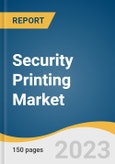Security printing finds extensive application in thwarting tampering, forgery, and counterfeiting activities, employing diverse techniques tailored to specific purposes. Anticipated market growth stems from escalating incidents of counterfeiting and forgery, particularly in banknotes, passports, postage stamps, stock certificates, identity cards, and product authentication. The utilization of security printing effectively precludes the falsification and tampering of the mentioned instruments.
The primary verticals for security printing encompass Banking, Financial Services, and Insurance (BFSI), along with industries like personal identification, ticketing, driving licenses, passports, and birth certificate issuance. Various printing techniques in security printing encompass holography, Ultraviolet (UV) printing, intaglio printing, geometric lathe work, micro printing, color-shifting ink, magnetic inks, guilloches, anti-copying marks, and rainbow printing.
Security printing serves as a deterrent against counterfeiters and diminishes occurrences of fraud. Notably, microprinting plays a pivotal role in thwarting the counterfeiting of currencies and bank checks. Moreover, serial numbers facilitate straightforward authentication of valid documents for auditing and monitoring purposes, while also aiding counterfeit detection through check digit tracking. Leveraging magnetic ink character recognition technology significantly enhances accuracy in the automated reading of documents and currencies, thereby minimizing errors.
The growing demand for brand safeguarding is projected to drive market expansion. This trend stems from businesses incurring substantial losses and reputational damage due to brand name counterfeiting. The amplified focus on brand protection is anticipated to foster market growth. Several techniques previously reserved for safeguarding valuable documents are now accessible to commercial printers. These techniques can be implemented across diverse printing platforms, including traditional offset, digital presses, and flexographic methods.
The market is fragmented and has the presence of several key players including Agfa-Gevaert Group; Ennis, Inc.; TROY Group, Inc.; Uniprint; Amgraf, Inc.; and Graphic Dimensions Inc.; and CETIS d.d. These players are adopting strategies such as product launches, partnerships & collaborations, and mergers & acquisitions to gain a competitive edge.
For instance, in February 2023, TROY Group, Inc., a leading secure print solutions provider, launched TROY 4001 and 4101 MICR printers to address the check printing demand of small & medium-sized enterprises and home offices. To meet the low-volume printing needs of SMEs, these printers offer the capability to produce MICR fonts. The TROY E-13B font is designed by the company to meet banking standards globally when used with these printers, and the TROY Magnetic Ink Character Recognition (MICR) toner is secure.
Security Printing Market Report Highlights
- The market is expected to grow due to increased demand for secure documents such as passports and ID cards, rising concerns about counterfeiting and fraud, and advancements in printing technologies enhancing security features.
- Lithographic printing was the largest segment in 2022, with a revenue share of 32.5%, and is expected to continue to retain its dominance over the forecast period as lithographic printing provides intricate details, incorporates specialized security inks, and accommodates variable data, ensuring high-quality and counterfeit-resistant documents
- The legal & government documents segment is projected to grow at the fastest CAGR of 8.7% over the forecast period. The legal & government documents segment growth is attributed to their need to deter counterfeiting, ensure data integrity, and maintain the authenticity and credibility necessary for official transactions, enhancing trust and compliance in critical processes
Table of Contents
Companies Mentioned
- Agfa-Gevaert Group
- Amgraf, Inc.
- DSS
- Graphic Dimensions Inc
- GRAPHIC SECURITY SYSTEMS CORPORATION (GSSC)
- Plus Technologies LLC
- Ennis, Inc
- TROY Group, Inc.
- Wellspring Software, Inc.
- CETIS d.d.
Table Information
| Report Attribute | Details |
|---|---|
| No. of Pages | 150 |
| Published | September 2023 |
| Forecast Period | 2022 - 2030 |
| Estimated Market Value ( USD | $ 3.14 Billion |
| Forecasted Market Value ( USD | $ 5.51 Billion |
| Compound Annual Growth Rate | 7.4% |
| Regions Covered | Global |
| No. of Companies Mentioned | 10 |









